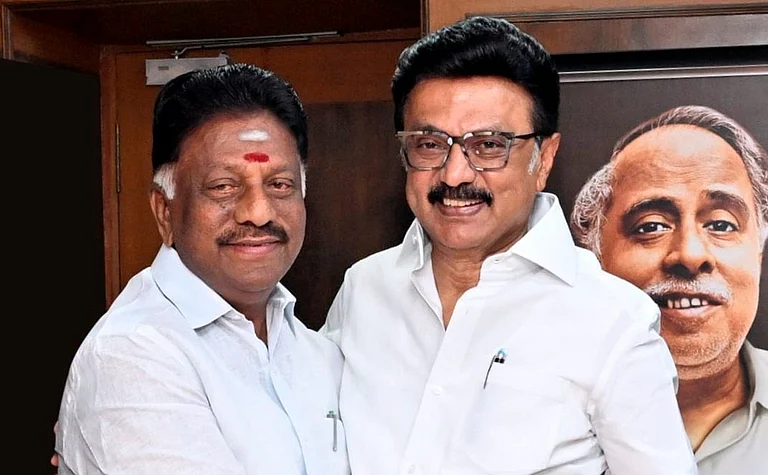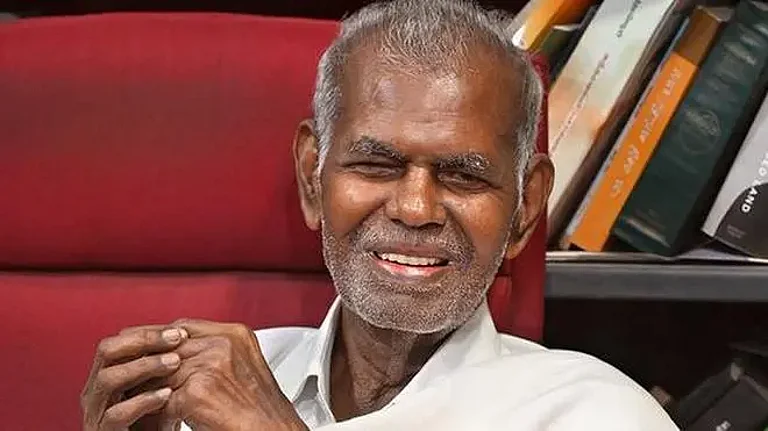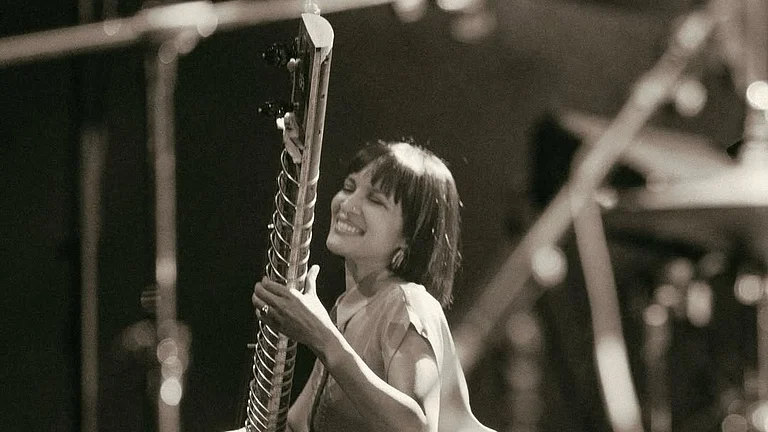One of Tamil Nadu’s most prominent advocates for mental health today, Dr C. Ramasubramanian did not arrive at his life’s mission by chance. His deeply personal journey in psychiatry was shaped by tragedy and loss, undergirding a quietly powerful resolve to stand by the most marginalised individuals battling mental illness. When his youngest brother began showing signs of a severe mental condition at a young age, Ramasubramanian, the eldest among seven siblings, saw how it shook their affluent family despite access to the best available treatments as nothing seemed to work. Today the youngest brother is in long-term care at one of the psychiatric rehabilitation centres founded by the eldest. These facilities would not exist if not for a pivotal decision rooted in grief and love.
The turning point came through the vision of their father, M.S. Chellamuthu. Hailing from modest beginnings, the civil engineer who helped build the Manimuthar Dam in Tirunelveli had married Sankaravadivoo Natchiar, a woman from the aristocratic Singampatti zamindar family. The emotional toll of their youngest son’s incurable illness left the couple shattered, but also sparked a vision in Chellamuthu: he wished nobody would endure the silent suffering caused by inadequate access to mental healthcare. He urged Ramasubramanian, who was then pursuing an MBBS degree and aspired to become a cardiothoracic surgeon, to consider dedicating his life to the often overlooked and underserved field of psychiatry instead.
One morning in 1982, Chellamuthu reiterated his advice before leaving for work. Hours later, he was killed in a road accident. The profound loss crystallised a sense of purpose in Ramasubramanian, who decided to abandon his earlier plans and pursue a speciality in psychiatry. Completing his MD and a diploma in psychiatric medicine from Madurai Government Medical College, he later earned a doctorate in community psychiatry from Madurai Kamaraj University. His wife, R. Rajkumari, then a Spanish teacher in a Madurai school, stood firmly by him. She trained in rehabilitation at the National Institute of Mental Health and Neuro-Sciences (NIMHANS), Bengaluru, and began working alongside him in the mission they had chosen together.
In 1992, Dr Ramasubramanian established the M.S. Chellamuthu Trust and Research Foundation in Madurai to make mental healthcare more accessible, affordable and humane. The foundation has since become a vital institution in south India, providing a range of services, including early intervention, psychiatric rehabilitation and community outreach. A searing moment in the journey came in August 2001, with the Erwadi fire tragedy, where 28 mentally ill patients were charred to death at a faith-based care facility where they had been held in chains. The incident marked a major turning point, not just for public awareness but also for Dr Ramasubramanian’s work. It propelled him to expand his efforts, sharpen targeted interventions and advocate more vocally for rights-based approaches to mental health.
In this brief conversation, Dr Ramasubramanian reiterates the urgent need for a national mental health strategy rooted in compassion, dignity and community-based care. For him, the personal and the professional remain inseparable, and together form the foundation of a life devoted to healing minds and restoring hope.
Edited excerpts:
Looking back, do you feel you chose the right path?
Absolutely. It wasn’t an effortless journey. My parents faced immense stigma and discrimination when my brother was diagnosed with a serious mental illness. Emotionally shattered after learning that his condition was incurable, they still managed to think beyond their tragedy. They began to reflect on the plight of people from poorer backgrounds, who suffered similarly but had no access to treatment. They dreamed of a world where mental healthcare was both affordable and accessible. I became the agent of that change. I shared their value system and trauma, and that shaped my life’s mission. That’s how my journey as a ‘wounded healer’ began—devoting over four decades to mental healthcare.
You began your work firmly rooted in modern medicine and fought hard against unscientific practices. However, you now advocate for a holistic approach that incorporates alternative medicine. Isn’t that a contradiction?
That’s not a contradiction at all. I have never compromised on the importance of modern medicine. Our entire foundation is built on it. However, over time, I realised that traditional healing systems could offer comfort and continuity for many patients, especially when used to supplement, not replace, allopathic care. We use alternative therapies to fill the gaps, not as a cure-all. Yoga-based relaxation therapies, nutritional guidance and community wellness practices have shown excellent results in our rehabilitation homes. These help reduce stress, improve emotional resilience and boost treatment adherence. Therefore, we propose an integrative model in which scientifically validated traditional practices complement allopathic care. The key is maintaining scientific rigour while being inclusive.
Many critics argue that religion, as demonstrated in the Erwadi tragedy, fuels unscientific and sometimes harmful mental health practices. Shouldn’t mental health activism adopt a more atheistic or irreligious stance?
It’s not that simple. Faith-based healing has existed in India across all religions, not just Islam. At the same time when the Erwadi tragedy happened, mentally ill people were chained at private healing centres near temples like Gunaseelam near Trichy and churches like the one at Puliyampatti near Jayamkondan. People believed in the power of holy water and oils to cure mental illnesses. Families often saw these centres, near religious institutions, as convenient places to abandon their mentally ill members. We must understand such practices in their historical and social context. Change doesn’t happen overnight. We need to engage with the religious leadership strategically, rather than alienating them. We have always worked with them to promote better practices rather than confronting their beliefs.
How did the Erwadi fire tragedy shape your work and expand your outreach?
The tragedy served as a pivotal moment. The then district collector invited us to support the affected community. What we saw, not just in Erwadi but also across the state, was heartbreaking. Tamil Nadu lacked adequate mental hospitals or exclusive psychiatric wards. Even the Kilpauk Mental Hospital in Chennai was overcrowded. There were almost no rehabilitation centres. Families routinely abandoned mentally ill members, often in inhumane conditions. When we tried to set up rehabilitation centres, no one would rent out their buildings to us. Even primary care centres didn’t stock basic psychiatric medicines. Psychiatrists were rarely available, even at district-level hospitals. These challenges formed the foundation for our future work.
What made your foundation’s facilities stand out from others?
We started small, with day care centres and simple meals. As support from philanthropists grew, we focused on creating spaces that didn’t resemble traditional asylums. We introduced horticulture, believing plants and flowers could have a calming, therapeutic effect. Our centre, located near Alagar Kovil on the outskirts of Madurai, is known as “Poonga Hospital” or “Hospital of Flowers” due to its garden-like surroundings. We also learnt from Justice G.M. Akbarali, a retired Madras High Court judge, who alerted us to the legal vulnerabilities of people with mental illnesses. Relatives, neighbours and strangers often misappropriate their property and income. Marital disputes and inheritance issues were common. Therefore, we established legal aid cells, enlisting lawyers who were sensitive to these issues. Mental health isn’t just about medicine—it’s also about justice.
Was religious orthodoxy a hurdle in transforming Tamil Nadu’s mental health landscape?
Initially, yes. However, we made a conscious decision to engage with religious leaders, rather than opposing them. In Erwadi, our first step was to build trust with the Dargah Committee. We assured them we weren’t there to challenge their faith but to integrate modern medicine in that belief system. They helped us construct a clinic on the shrine compound and later facilitated the building of a mental hospital nearby. Even today, members of the Dargah Committee volunteer to spread awareness about modern psychiatric care. We followed the same approach in Sivakasi, where we partnered with the Sathya Sai Baba Trust to establish a similar facility that now serves the industrial workers in the region.
What does India’s mental health sector need the most today?
We need more trained professionals, including psychiatrists, nurses and community volunteers. The latter are particularly vital, as they are often the first point of contact for people in distress. They need proper training, especially in handling patients who might be aggressive or substance-dependent. We also need to sensitise NGOs working in other areas to the importance of mental health. Broader collaboration will expand our reach. Rehabilitation must go beyond treatment. Vocational training and economic empowerment are essential. A job can provide survivors a sense of meaning and dignity. In recent years, Tamil Nadu has included individuals with mental disabilities in the Mahatma Gandhi National Rural Employment Guarantee Scheme. In Madurai district, for instance, many beneficiaries are getting 100 days of work annually. Collective efforts helped setting up psychological counselling centres in every educational institution in Madurai, in collaboration with the government. That too has shown remarkable results. Above all, we must fight the stigma. Social inclusion is as vital as medicine. And hope—that’s the most powerful medicine we can offer. People with mental illness must be considered assets to society, not liabilities.



























